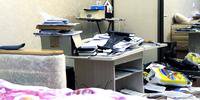The Case of Voronchikhin and Others in Simferopol
Filter
- #
Investigator of the Investigative Committee of the Russian Federation V.A. Novikov initiates a criminal case against several Jehovah's Witnesses from Crimea. According to the investigation, they committed "active actions of an organizational nature, expressed in the organization of propaganda meetings, at which discussions were held on the texts and religious provisions of Jehovah's Witnesses."
- #
- #
Aleksandr Voronchikhin and Dmitriy Zakharevich are filing an appeal against the court's decision to allow a search of their home.
- #
The case against Victor Mani is separated into a separate proceeding, and later new defendants appear in it.
- #
In three cities of Crimea — Armyansk, Simferopol and Saki — searches are being conducted in 9 houses of believers.
Investigator Novikov involves Dmitry Zakharevich and Alexander Kopylets as defendants in the criminal case.
- #
Zakharevich and Kopylets were placed under house arrest.
Several other Jehovah's Witnesses are being searched.
- #
The case is submitted to the Simferopol District Court for consideration.
- #
The measure of restraint in the form of house arrest for Dmitry Zakharevich and Alexander Kopylets is extended until December 11, 2023. Alexander Voronchikhin and Ekaterina Demidova were chosen as a preventive measure in the form of a written undertaking not to leave and proper behavior.
- #
Judge Olga Chepil decides to return the case to the prosecutor "to remove obstacles to its consideration by the court."
- #
The Supreme Court of the Republic of Crimea makes a decision on the appeal of the prosecutor and the appeal of the defender against the decision of the Simferopol District Court to return the criminal case to the prosecutor, initiated by the same court. The appeal upheld this ruling. The case must be returned to the prosecutor in order to remove obstacles to its consideration.
The house arrest of A. Kopylets and D. Zakharevich has been extended until April 26, 2024.
- #
Senior investigator A. Rudoy changes the measure of restraint for Aleksandr Kopylets and Dmitry Zakharevich to a recognizance not to leave and proper behavior.
- #
Oleksandr Kopylets is charged with a new edition. The believer does not admit his guilt. "I do not agree with the charges, since I have never carried out, organized or continued extremist activities," he said.
- #
Oleksandr Kopylets is notified of the completion of the investigation.
- #
The case of the believers is submitted to the Simferopol District Court. It will be considered by judge Aleksandr Serdyuk.
- #
Witnesses for the prosecution are being interrogated - law enforcement officers Yatsenko and Latyshev.
Yatsenko tells the court about the operational-search measures against Jehovah's Witnesses in Crimea, carried out since 2017 together with the FSB: wiretapping of believers' telephone conversations, monitoring them, and so on.
During the interrogation, the judge instructs Yatsenko several times to base his testimony only on facts, not on guesses. For example, in his speech, Yatsenko interprets the concept of political neutrality as "non-recognition of the authorities," and calls a meeting of several people at home a gathering of an extremist organization. However, he cannot say what exactly happened at the meetings of Jehovah's Witnesses, because he does not remember.
The second witness, Latyshev, answered the lawyer's questions about whether the defendants put their faith above the laws [of the Russian Federation], above any other faith. Is this somehow recorded in the case file? He replies that he can't say anything. According to him, the unlawful actions of the defendants consisted in preparing and turning on a video conference, with the help of which a liturgical meeting was held.
The defense asks Latyshev if he knew that according to the Plenum of the Supreme Court of October 28, 2021, Jehovah's Witnesses can perform regular meetings for worship or other rites and gather together. The witness replies, "I won't speak, I don't remember. I haven't read or heard this particular organ."
- #
One of the witnesses says that she knows Aleksandr Voronchikhin and knows him only from the positive side. She is not personally acquainted with the other defendants. After the prosecutor asks to confirm the testimony she gave earlier at the preliminary investigation, the witness replies that he cannot confirm it due to significant discrepancies.
- #
A secret witness is interrogated, who acts under the pseudonym Vasily Sergeevich Dudka. He describes meetings for worship as meetings of believers at which prayers were read, the Bible was studied, and songs were sung. Of Demidova, he says that she was engaged in "recruiting new members," but he cannot name a single person whom she would have recruited.
The court refuses to satisfy the defense's motion to declassify the witness.
- #
Another prosecution witness tells the court that after the ban on legal entities in 2017, the defendants continued to meet at their homes to discuss the Bible. When asked by the prosecutor whether there were calls to extremism at the worship meetings, the witness explains: "If there had been such calls, such a parishioner would have been expelled from the congregation." He also emphasizes that "it was a peaceful gathering."
- #
Olga Griva, who conducted a religious forensic examination, is being interrogated. She admits that the religion of Jehovah's Witnesses is not prohibited in Russia, but calls the actions of believers a continuation of the activities of the liquidated organization. According to the defense, the expert goes beyond his competence and gives a legal assessment of the actions of believers without having a legal education.
- #
Material evidence is being examined: at two hearings, an audio recording of a major annual meetings for worship of Jehovah's Witnesses held in Simferopol in 2010 is listened to. It examines, among other things, how God shows accessibility, empathy, generosity, forgiveness, prudence, and devotion.
- #
The examination of material evidence continues — the court listens to 35 files with audio recordings of piano compositions.

